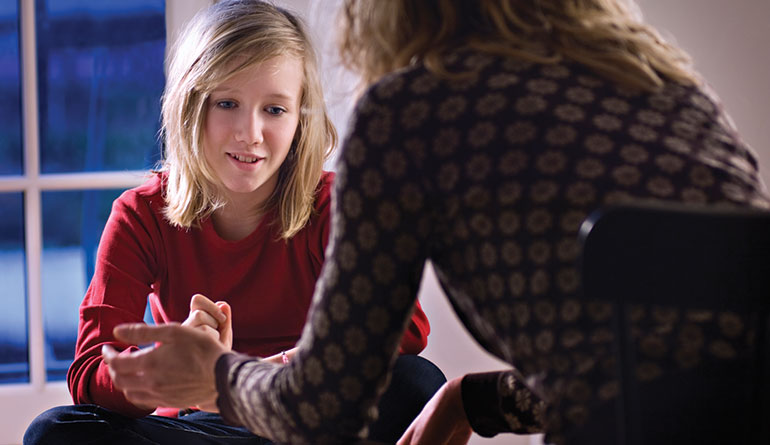When Allison, 14, began displaying a great deal of irritability and her grades dipped, her parents chalked it up to typical teen behavior and the adjustment to high school. But when she began spending most of her time alone in her room, they became concerned. Was this a phase that would pass? Or was something really wrong?
Is Outside Help Warranted?
Err on the side of caution when you are concerned about your teen’s behavior or emotional state. Watch for the child who distances herself from family and peers, has falling grades, or pulls back from activities. Notice changes in eating, sleeping, or personal hygiene, periods of sadness, apathy, tearfulness, agitation, or anger.
As you make your decision, examine your own attitudes about therapy. It’s common to feel stigma about it. I’ve worked with too many parents who came to the first session feeling like failures because they had to seek outside help.
Adoption presents an extra layer of challenge. A teen may think about adoption and birth parents more frequently as she parses her identity. At the same time, these increased thoughts can lead her to feel disloyal. It’s inevitable that some teens will need extra support during this period.
Finding a Therapist
At C.A.S.E., we rarely conclude that a teen’s issues have no connection to adoption. How do you find an “adoption-competent” mental health professional? Your agency may have a counseling team, or be able to refer you to a community resource. If you belong to a support group, ask the members for referrals. Beware of the therapist who has a “pathological” view of adoption, blames you for your teen’s difficulties, excludes you from treatment, or avoids discussing adoption.
Convincing Your Teen
When you first raise the idea of therapy, you’ll probably be met with resistance. Ask your teen to hear you out. “Your dad and I are worried that something is troubling you. I know there’s been a lot of tension and fighting among us lately.” Don’t ask whether the “problem” is related to adoption. Teens may not know whether their feelings are adoption-related, and will go on the defensive if you seem to think something is “wrong” with them.
Let your teen express her feelings, and share yours. Try to determine what’s fueling her resistance. You might respond, “Sometimes an outsider can see what we can’t and help us solve a problem.” Ask your teen to see this professional at least once. Let her know that, if she doesn’t like the therapist, you can find another one.
The Family’s Role
In the beginning stages of adoption therapy, the therapist will want to meet with your teen individually, in order to develop trust. He’ll ask the teen to share his adoption story, paying careful attention to the feelings behind it. However, adoption-competent therapy almost always involves the family, exploring how you communicate (especially around adoption) and handle conflict. You may be given “homework” to obtain more information about your teen’s birth history, if possible.
With the support of a therapist who could “speak the language of adoption,” Allison felt safe enough to share that she was intentionally isolating herself as she began to feel different from her peers. She was also thinking about trying to find her birth family, but felt disloyal for her curiosity.
“I felt a tremendous relief after our first session,” said her mom. “She helped us explore issues that we would not have known to discuss on our own.”


